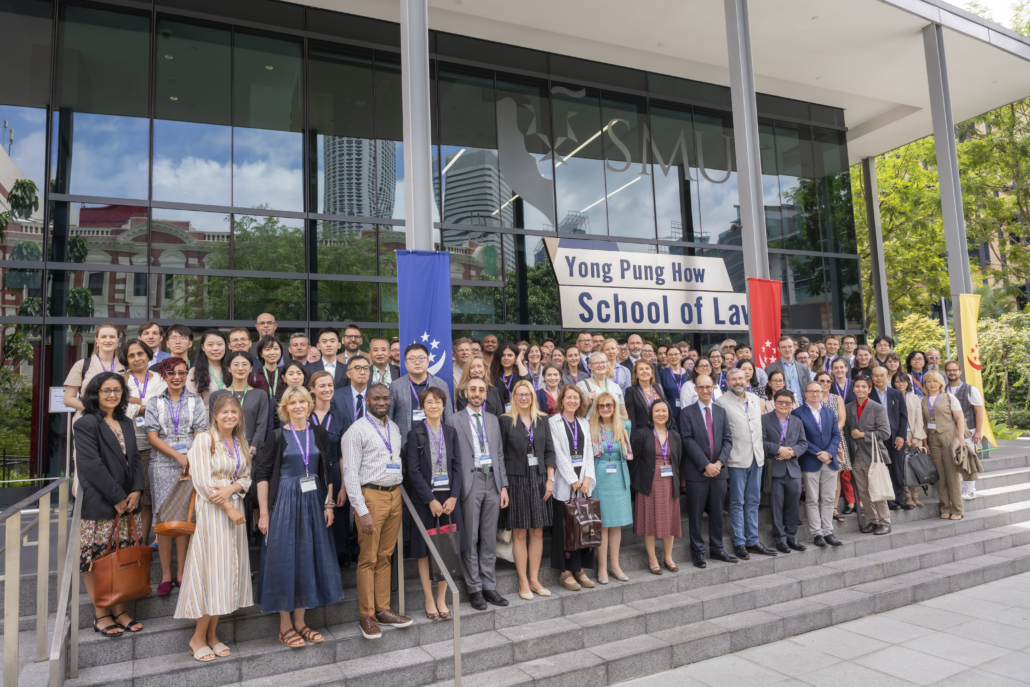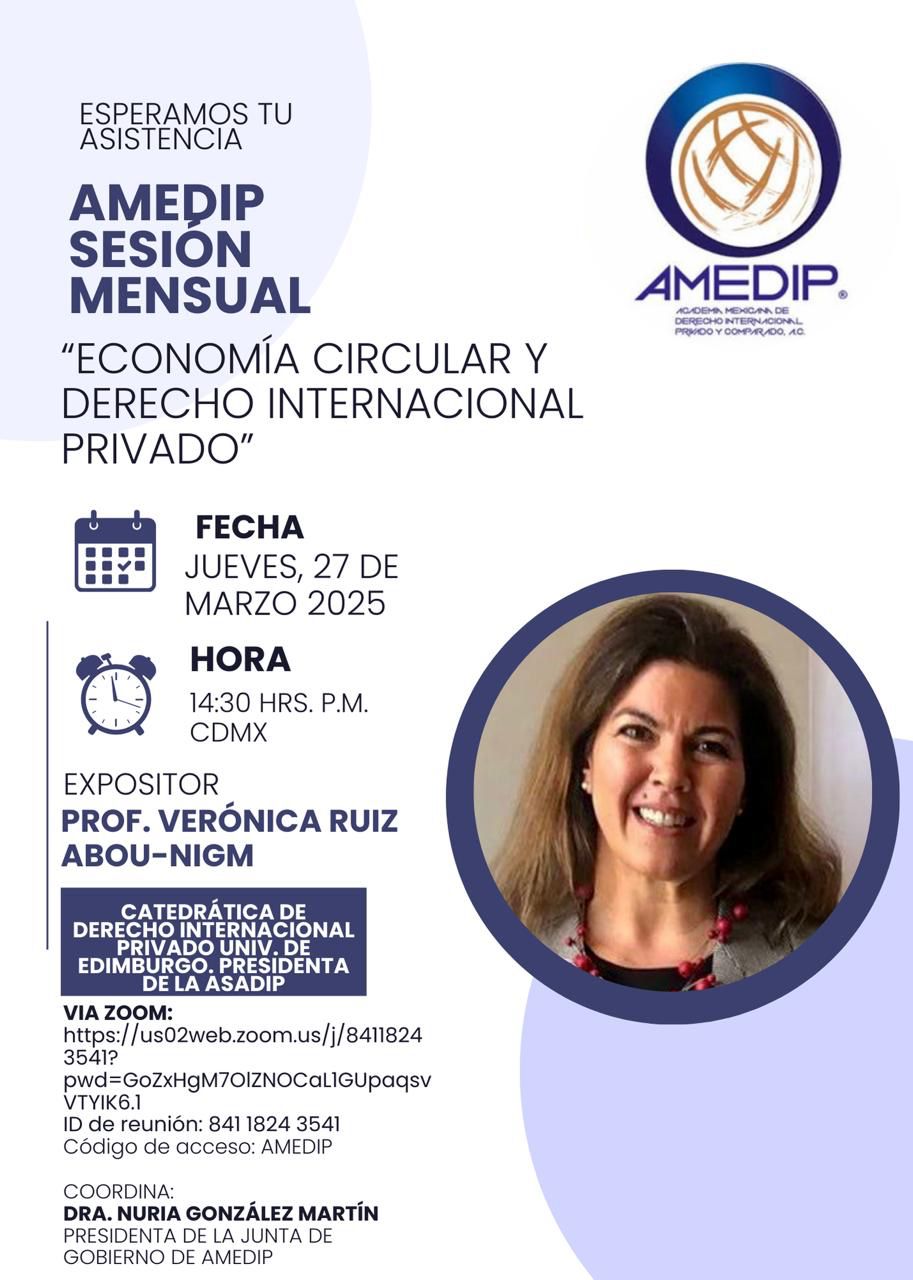Views
Views and News from the 9th Journal of Private International Law Conference 2023 in Singapore
Four years after the 8th JPIL conference in Munich, the global community of PIL scholars finally got another opportunity to exchange thoughts and ideas, this time at Singapore Management University on the kind invitation of our co-editor Adeline Chong.

The conference was kicked off by a keynote speech by Justice Philip Jeyaretnam (Singapore International Commercial Court), providing an in-depth analysis of the Court of Appeal’s decision in Anupam Mittal v Westbridge Ventures II [2023] SGCA 1 (discussed in more detail here).
The keynote was followed by a total of 23 panels and four plenary sessions, a selection of which is summarised below by our editors.
The EU Sustainability Directive and Jurisdiction
The Draft for a Corporate Sustainable Due Diligence Directive currently contains no rules on jurisdiction. This creates inconsistencies between the scope of application of the Draft Directive and existing jurisdictional law, both on the EU level and on the domestic level, and can lead to an enforcement gap: EU companies may be able to escape the existing EU jurisdiction; non-EU companies may even not be subject to such jurisdiction. Effectivity requires closing that gap, and we propose ways in which this could be achieved.
(authored by Ralf Michaels and Antonia. Sommerfeld and crossposted at https://eapil.org/)
- The Proposal for a Directive on Corporate Sustainability Due Diligence
The process towards an EU Corporate Sustainability Due Diligence Directive is gaining momentum. The EU Commission published a long awaited Proposal for a Directive on Corporate Sustainability Due Diligence (CSDDD), COM(2022) 71 final, on 23 February 2022; the EU Council adopted its negotiation position on 1 December 2022; and now, the EU Parliament has suggested amendments to this Draft Directive on 1 June 2023. The EU Parliament has thereby backed the compromise textreached by its legal affairs committee on 25 April 2023. This sets off the trilogue between representatives of the Parliament, the Council and the Commission.
No Sunset of Retained EU Conflict of Laws in the UK, but Increased Risk of Sunburn
By Dr Johannes Ungerer, University of Oxford
The sunset of retained EU law in the UK has begun: the Retained EU Law (Revocation and Reform) Act 2023 received Royal Assent at the end of June. The Act will revoke many EU laws that have so far been retained in the UK by the end of 2023.
The good news for the conflict of laws is that the retained Rome I and II Regulations are not included in the long list of EU legal instruments which are affected by the mass-revocation. Both Regulations have been retained in the UK post-Brexit by section 3 of the European Union (Withdrawal) Act 2018 and were modified by the Law Applicable to Contractual Obligations and Non-Contractual Obligations (Amendment etc.) (EU Exit) Regulations 2019 (as amended in 2020). The retained (modified) Rome I and II Regulations will thus be part of domestic law beyond the end of 2023. Yet this retained EU law must not be called by name anymore: it will be called “assimilated law” according to section 5 of the Retained EU Law (Revocation and Reform) Act 2023 (although the title of this enactment, like others, will strangely continue to contain the phrase “Retained EU Law” and will not be changed to “Assimilated Law”, see section 5(5)).
News
Defending Access to Justice: The Crucial Battle for the IJI
Published on behalf of the IJI, Den Haag
In the heart of The Hague, a critical institution of international legal knowledge faces an existential threat. The International Juridical Institute (IJI) (translated in English to mean the Hague Institute for Private International Law), a venerable organization with a century-long history of providing essential legal guidance, stands on the brink of liquidation due to declining government support.
Founded in 1918 at the iconic Peace Palace, the IJI emerged as a unique global resource. Born in the aftermath of World War I, the institute was conceived as a “gift to the world” noble vision supported by leading businessmen, ministers, and statesmen. The IJI has been a beacon of legal expertise for over a hundred years, offering free and cost-effective advice in the complex realm of private international law. The institute’s current predicament is a stark testament to the fragility of specialized legal resources. Successive government cuts, culminating in eliminating the social advocacy subsidy scheme in 2019, have systematically undermined the IJI’s financial stability. What makes this situation particularly alarming is not just the potential loss of an institution but the broader implications for access to justice.
The IJI is not merely an archive of legal knowledge; it is a critical resource for individuals navigating complex international legal challenges. Many of these cases involve vulnerable populations, including children, who rely on expert guidance to traverse intricate cross-border legal landscapes.
Ironically, the government’s cost-cutting measures may ultimately prove counterproductive. The reduction in funded legal aid is likely to generate more protracted and expensive legal proceedings, potentially negating any initial savings.
The IJI is making a final, humble appeal: a modest annual subsidy of €260,000 to continue its vital work. This relatively small investment could ensure another century of legal expertise and maintain critical access to justice for countless individuals.
How You Can Help
The legal community and concerned citizens have a unique opportunity to make a difference:
- Sign the Petition: Visit the IJI petition page and add your name to support the institute’s continued existence.If you would like to support this cause, we would like to add your signature to the grant application. You can click on the next link: https://petities.nl/petitions/behoud-de-toegang-tot-het-recht-voor-iedereen?locale=de. This leads you to a website where you can sign very easily by giving your name (on the field ‘naam’), email address (on the field ‘emailadres’) and domicile (on the field ‘woonplaats’). You could also tick the box if you want your name visible on the list, if not, you remain anonymous. Please note that after signing, you will receive an email in which you are asked to confirm your signature by clicking on the provided link. Only after confirming, the signature will be registered.
- Spread Awareness: Share the IJI’s story within your professional networks and social circles.
- Contribute Ideas: Of course, we are also open to other ideas that can ensure that our wonderful institute can experience a second 100-year term. If you would like to exchange thoughts with us about this, please do send us an email to info@iji.nl and we will get in touch.
The potential loss of the IJI represents more than the closure of an institution. It symbolizes a potential erosion of specialized legal knowledge, international cooperation, and accessible justice.
As members of the legal community, we have a responsibility to support institutions that serve the broader public good. The IJI’s century of service is a testament to the power of dedicated legal expertise in bridging complex international legal challenges.
Together, we can help ensure that this invaluable resource continues to serve global legal needs for generations to come.
Thank you very much for your support!
Virtual Workshop (in English) on April 1: Carlos Esplugues on “Take Domestic Law and Run? The Application of Foreign (Private? State?) Law in Times of Uncertainty”

On Tuesday, April 1, 2025, the Hamburg Max Planck Institute will host its monthly virtual workshop Current Research in Private International Law at 11:00 a.m. – 12:30 p.m. (CEST). Professor Carlos Esplugues (University of Valencia) will speak, in English, about the topic
“Take Domestic Law and Run? The Application of Foreign (Private? State?) Law in Times of Uncertainty”
The possible application of foreign law is one of the features of contemporary private international law, a discipline that is particularly sensitive to the social, political and economic environment in which it operates. However, the redefinition of the role of the State in modern societies, technological changes or the growing wave of intolerance and fear towards what comes from abroad in many parts of the world are creating a new environment that affects this question in a pluralistic way. Beyond the classical issue of the nature of the applicable law and its relationship to the process, questions are being raised about the viability of this possible applicability and the conditions under which it can be established.
The presentation will be followed by open discussion. All are welcome. More information and sign-up here.
If you want to be invited to these events in the future, please write to veranstaltungen@mpipriv.de.
AMEDIP’s upcoming webinar: Circular Economy and Private International Law (27 March 2025 – In Spanish)

The Mexican Academy of Private International and Comparative Law (AMEDIP) is holding a webinar on Thursday 27 March 2025 at 14:30 (Mexico City time – CST), 21:30 (CET time). The topic of the webinar is ‘Circular Economy and Private International Law’ and will be presented by Prof. Verónica Ruiz Abou-Nigm (in Spanish).


